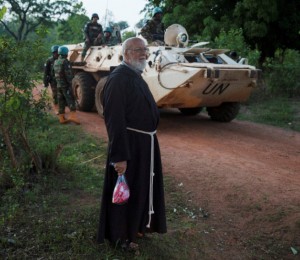Displaying items by tag: Peacemaking
UK urged to finance South Sudan peace-building
A Christian Aid poll reveals 53% of British adults agree that the government should be a leader in providing humanitarian aid and commit to financing a peace process in South Sudan. The leaders of Christian Aid, CAFOD, and Tearfund have written a joint open letter to the PM after the Pope, the Archbishop of Canterbury, and the Moderator of the Church of Scotland visited South Sudan last week. The charities warned of South Sudan’s growing hunger crisis with 54% of the population already living with crisis-level food insecurity. Despite the worsening situation, the UK's aid budget for South Sudan was cut by 59% in 2021. This triggered cuts to critical peacebuilding and resilience work with communities. CAFOD’s director said that the people of South Sudan have suffered much due to conflict and instability, but instead of being able to rely on UK support, the UK has cut its funding.
Peacemaking Power of Prayer
Religious leaders have achieved a truce between rebel groups in the Central African Republic through a ‘spiritually inspired’ method.
JUNE 20, 2017 —One of Africa’s worst conflicts may have finally ended through a rare type of diplomacy. On June 19, more than a dozen armed groups in the Central African Republic signed a peace accord. Yet they did not do so through an official negotiator. Rather a religious group in Italy used what it calls a “spiritually inspired” method – building empathy and compassion – to help forge a truce.
This diplomatic feat was achieved by the Community of Sant’Egidio, a Roman Catholic lay group that works quietly and discreetly around the world to end conflicts. It puts prayer at the heart of its mediation. Its efforts have been so successful that the United Nations formally signed an agreement on June 9 to cooperate with Sant’Egidio in ending other conflicts. Its president, Marco Impagliazzo, says the group’s success lies in being seen as a neutral party that relies on patience and shared values to create trust between foes.
A Dutch scholar, Gerrie ter Haar, explains such faith-based diplomacy: “Bringing the spiritual dimension into the peacemaking process can create access to the more deep-seated, affective base of the parties’ behavior, enabling them to examine critically their own attitudes and actions.”
The conflict in the Central African Republic erupted in 2013 when the mainly Muslim Seleka rebels took power, triggering violent reprisals by militia groups that are nominally Christian. As many as 6,000 people have died. From the start, however, local religious leaders – Islamic, Catholic, and Protestant – played a key part in protecting civilians and initiating talks. They described their “weapons” as “prayer and dialogue.”
As fears of genocide grew, however, the UN, France, and the African Union sent in troops to quell the fighting. This allowed the election of a new president last year, although his influence barely extends beyond the capital. When fighting erupted again in May and more than 100,000 people had to flee, Sant’Egidio was able to bring 13 rebel groups to Rome for talks and reach a deal.
Many details of the pact still need to be implemented. And victims of the violence await the establishment of a commission to document the atrocities and achieve a level of justice and social reconciliation.
But the country, which is one of the poorest in Africa, is now rebuilding. And that is due in part to a type of conflict resolution that uses spiritual qualities to transcend divisions and end wars.
Let us rejoice that united prayer can be used of the Lord to heal conflicts and begin to pray for those areas of the world where there are ongoing conflicts.

